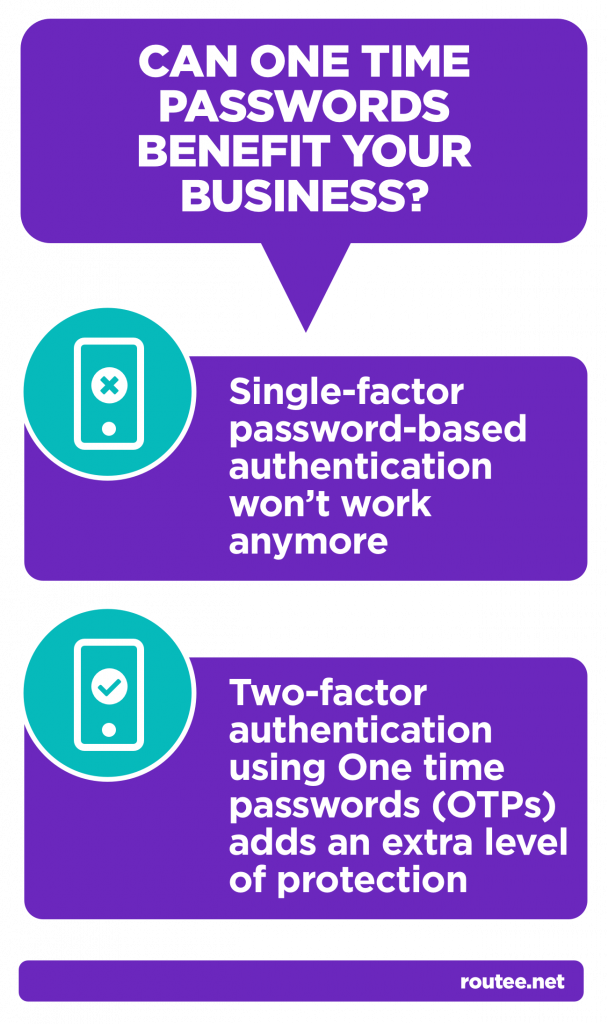
Can One Time Passwords benefit your business?
Why are OTPs important across industries?
With online identity theft rising throughout the world, security has been a major issue and relying on single-factor password-based authentication just won’t do. Two-factor authentication addresses the issue by adding an extra level of protection, making it more challenging to access unauthorized information, networks, or online accounts.
One time passwords (OTPs) can work as the second step in two-factor authentication and they are a popular choice for organizations looking to boost their security. In 2018, the global two-factor authentication market was evaluated at $3,5B and it is projected to reach $8,9B by 2024, as revealed by a Market Research Future study, while the OTP market was estimated at $1,5B in 2018 and will reach $3,2B by 2024. From banking to government, to healthcare, and retail, almost every industry is dependent on the OTP verification process in order to make clients feel secure and safe. So, without further ado let us take you through some important use cases of two-factor authentication using OTP.

Industrial applications using One Time Passwords
Financial Institutions
Financial institutions, with banks at the forefront, have always been popular targets for cyberattacks. If a hacker gains access to someone’s bank account, money is not the only thing they can get access to. They can actually get a lot more than just money. They also have access to credit card information and Social Security numbers, leading to identity theft cases that will take many years to resolve.
Any organization that processes and stores card payment data, including banks, needs to provide as much security as possible to protect customer data, offering at least two separate forms of authentication before a user can access their account. For example, if a user wants to make changes to their web banking profile, their identity can be verified by an SMS message sent to their mobile phone withholding an OTP. This is a crucial step for security and banks in this way can confirm that the changes made were initiated by the account owner. Bank clients have high expectations for data privacy, protecting them is vitally important in order to build trust and loyalty.
Corporate Ecosystem
Employees are increasingly more mobile, working on their personal devices remotely. As a result, they are accessing systems, company-owned applications, data, shared documents, educational material and conversations from virtually anywhere. This can put companies at risk. The OTP verification process serves as a unique tool to secure devices and maintain the validity of accounts for business, giving access to any vital information with ease.
Using this process corporate IT can rest assured that if a device is compromised, 2FA will make it hard for anyone to gain illegal access. Take for example a corporate user who logs into their account on a new device, an SMS with a PIN code will have to be sent to their device to complete the process. Employee mobility has created a happier and more productive workforce. Integrating 2FA Authentication using OTPs into the digital workspace makes this possible, providing the necessary security for the organization and convenience for your employees.

Healthcare Industry
In the healthcare industry, patients have turned sensitive with respect to sharing medical reports and details. It is true that it is nearly impossible to be 100% secure in the healthcare environment where the sharing of information about a patient can prove critical in the process of improving their health. However, with greater data access and an increasing amount of details available on portals, the risk for data breaches is even higher. In recent years, health providers and portals have been a major target for hackers. And of course, the COVID-19 pandemic has heightened those risks. Login passwords to access healthcare systems are no longer enough.
Data breaches often target healthcare employee credentials to gain access to a system. Therefore, internal authentication should be a high priority for health providers. OTPs are one of the best ways of safeguarding sensitive and private information, as they add a layer of security, ensuring that access is granted only to those permitted. Whenever someone who is not authorized to login tries to get into the account, they are asked for the OTP. If they are eligible to enter the account, they can submιt the OTP and gain access to the data. For example, after entering a username and password into a portal, a random OTP can be sent to users’ mobiles, which they then enter as the second factor to complete the login process. This one- time password can be sent through Viber or be heard on any phone they have designated. This way patient records often needed by a range of professionals to deliver the required care can be secured.
Government Services
As government employees are prime targets for cyberattacks due to their access to sensitive data, such as financial, economic, and military records, they are often victims of hackers who typically target them using phishing scams, posing as trusted sources to access login credentials. In the past decade alone, we have seen high-profile data breaches that disrupted government services and affected millions of people whose private information was leaked. Citizens, however, expect consistency and protection from their governments and reliable and secure systems are essential to that end. Two-factor authentication using OTP ensures that only approved users can access government data, reducing the risk of hackers infiltrating a system.
E-commerce sites
With eCommerce sales growing immensely in recent years, fraud has been growing nearly twice as quickly, with account takeover being the fastest-growing fraud threat, causing $5.1 billion in losses in 2017. Although many online retailers were hesitant to implement 2FA so as to not discourage customers from buying, the risk of fraud is becoming a greater threat for their business.
Ecommerce fraud can be easily prevented by adding authentication to online accounts. Not only does this reassure customers that their data is protected, but it also discourages hackers who prefer to target less secure websites. By reducing the risk of fraud using authentication, eCommerce companies can increase their bottom lines and build a reputation for protecting customer data. So, after your customers complete a purchasing or selling transaction on your website, you can send them a voice call or message via Viber to their registered device with a one-time numeric. This enables strong customer security, without being too complicated for them.
Technology and mobile apps
Many applications offer their basic app free for users, while the premium version can only be accessed via a paid upgrade. In such cases, an OTP can be used to authenticate mobile users and their intent to upgrade, by verifying customer phone numbers using SMS passcodes, preventing robotic registrations and reducing fraudulent memberships and incorrect membership conditions. Another way your business can use 2FA with OTP is to verify phone numbers during the registration process of new users, in order to prevent bots from creating bulk accounts that strain your systems and resources. Using 2FA Missed Call you can eliminate the risk of spam more effectively than CAPTCHA, as users enter a password sent to their phones.
Wrapping up
Customers have become intolerant towards any kind of data breach. That is why an increasing number of industries are using OTP two-factor authentication before processing any transactions. OTPs can help organizations meet many of their security requirements, while limiting costs, simplifying management, and helping the bottomline. If you are considering 2FA for your business, with Routee you can use several approaches to employ one-time passwords (OTP), from SMS to email, to Voice and Viber and missed calls.
